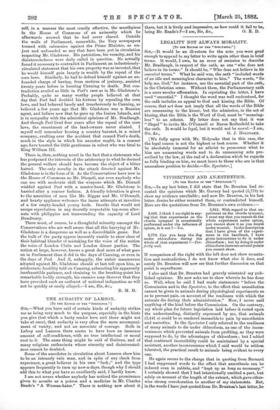LEGALITY NOT ALWAYS MORALITY.
ITO TEE EDITOR OF THE " SPECTATOR:9 SIR,—It would be an ill-return for the note you were good enough to append to my letter to write again other than in brief terms. It would, I own, be an error of omission to describe Mr. Bradlaugh, in respect of the oath, as one "who does not believe in its terms." It should be, "Who does not believe in its essential terms." What he said was, the oath "included words of an idle and meaningless character to him." The words, " So. help me, God," for instance, are the essential part of the oath, in the Christian sense. Without them, the Parliamentary oath is a mere secular affirmation. In reprinting the letter, I have used "essential" I thought the word was well understood, for the oath includes an appeal to God and kissing the Bible. Of course, that act does not imply that all the words of the Bible are unmeaning to the kisser, but the admission, in the act of kissing, that the Bible is the Word of God, must be " meaning- less " to an atheist. My letter does not say that it was " illegal " to invite Mr. O'Connell or Baron Rothschild to take the oath. It would be legal, but it would not be raoraL—I am,
[We fully agree with Mr. Holyoake that in this case, the the legal course is not the highest or best course. Whether it be absolutely immoral for an atheist to pronounce what to him are unmeaning words and to do unmeaning acts pre- scribed by the law, at the end of a declaration which he regards as fully binding on him, we must leave to those who are in that anomalous position to decide.—En. Spectator.]


































 Previous page
Previous page